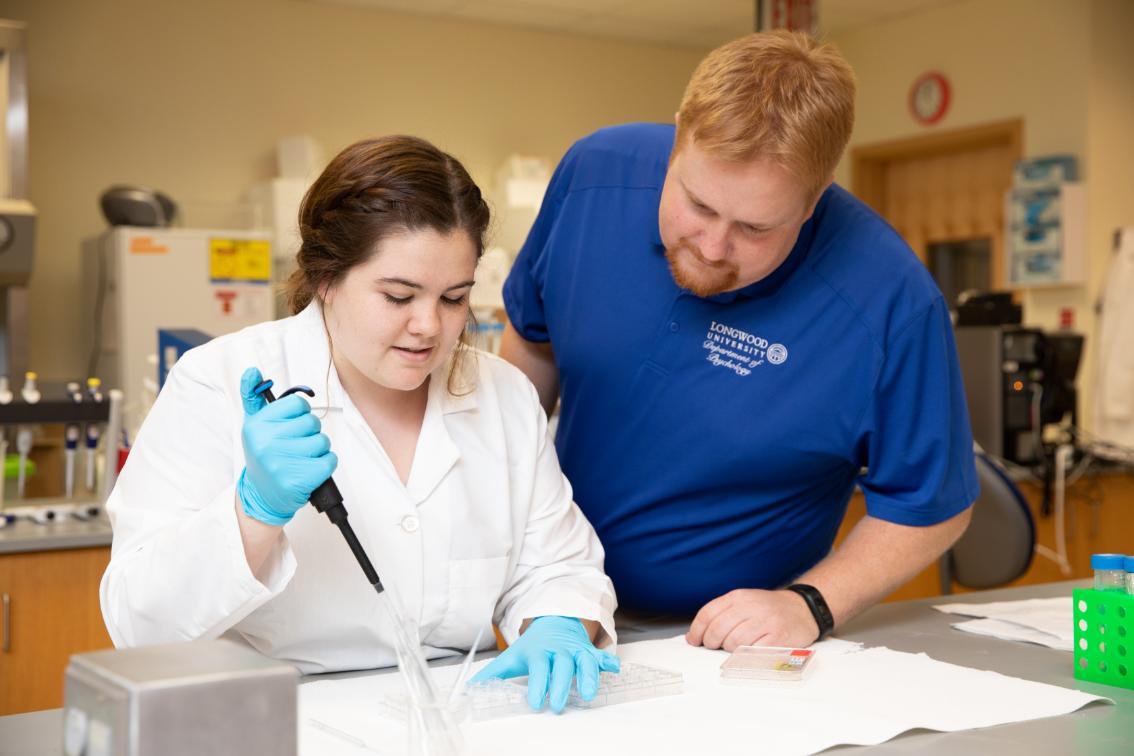

Brianna LaFratta ’20 is a biology major with a minor in neuroscience. This summer she is participating in the PRISM summer research initiative — Longwood’s signature program that pairs students with faculty members for eight weeks of intensive paid research work.
Her summer project with Dr. Maxwell Hennings, assistant professor of neuro psychology, is related to chemo brain — a common term used by cancer survivors to describe thinking and memory problems that are believed to be caused by cancer treatment. The causes of chemo brain, which is also known as chemo fog or cancer-related cognitive impairment,are not well understood.
This is LaFratta’s first time participating in PRISM. She’s halfway through the eight weeks and she said the experience has already been transformative.
“I appreciate and understand the brain better,” LaFratta said. “Before this, I was just reading about the brain. Now, I’ve been hands on. It’s made me much more excited about pursuing neuroscience as a field.”
We caught up with LaFratta to find out more about her PRISM research and what else she’s doing in Farmville this summer.
How did you get involved in PRISM?
My freshman year there was a student who moved in across the hall from me in Curry. He was a senior biology major and he was doing PRISM. I remember I asked him a bunch of questions about it and I thought it was so cool that he was doing one-on-one research with a professor. I thought it was something I could never do. But then I decided to apply and I got in. And now I’m four weeks in and I’m learning so much. Anybody can do it if they truly want it.
Tell us about your project.
Our project deals with a phenomenon called chemo brain, which is common in breast cancer patients. Symptoms include memory problems, trouble learning new tasks or remembering names, confusion, and difficulty concentrating or multi-tasking. There are stories about people putting their cell phones in the freezer and they attribute that to chemo brain. Cancer survivors are still having symptoms associated with chemo brain or chemo fog years after being treated. I have people in my family who know people who have had cancer and experienced chemo fog. It is a frustrating and debilitating side effect of cancer treatment. This project aims to better understand what is causing the memory changes and cognitive decline that people who receive chemo treatments experience.
What we are doing relates to neurogenesis, which is the birth of new neuronal cells. When someone receives chemotherapy treatment what the drug does is target actively dividing cells so that it can kills those, which kills the cancer. But it’s hypothesized that it’s also killing cells in the hippocampus of the brain. That’s not good. The hippocampus is associated with learning and memory. The dentate gyrus is where adult neurogenesis is happening — so where new neurons are being formed. It is believed that the chemotherapy is affecting those cells. What we’ve been doing is looking at slices of the brain to see how the structures are affected. We are looking at three different chemotherapy drugs that are commonly used to treat breast cancer: cyclophosphamide, doxorubicin and 5-fluorouracil. We are looking to see how the chemotherapy is affecting how many neurogenic cells are being produced in the dentate gyrus.
What’s your favorite part of your research?
I’ve been able to see the parts of the brain up close in a way I never expected. It’s a very visual process. As I’m looking through a microscope counting the cells in the brain, it feels like I’m doing real research — because I am. That’s been my favorite part. Also, getting to use the cryostat machine to prepare the brain tissue is not an experience that many undergraduates have.
Have you had any success?
We have definitely had some success. We are looking at the cells in the dentate gyrus under the microscope. What we are doing is counting the cells to see if there’s a difference between the control group and the groups that got the chemotherapy. We have been able to see those cells. Now we are waiting to see if our hypothesis is correct. We don’t have the data analyzed yet. But we are collecting it and it’s really exciting.
What are your career goals or plans for after graduation?
After graduation I’m considering three different paths: doing research in a lab, going into the Peace Corps or going to graduate school for neuroscience. My broader goal is that one day I’ll be able to tie my skills in neuroscience together with my skills in theatre. I’ve done theatre since high school and I’ve been involved in shows here at Longwood as well. I really love it — and I love neuroscience as well. I’m not sure how I connect the two yet, but that’s my dream.
Onto the important questions: What is your favorite thing to do around Farmville this summer?
I really enjoy High Bridge. I’ve been going there a lot recently. Sometimes I’ll rent a bike and go. Or, just walk on the trails.
What is your favorite thing to eat in d-hall?
The pasta bar.
